Acnes are one of the most faced skin conditions in the world. Acne basically is confused with pimples, but pimples are actually one of the symptoms of acne and acne is the disease affecting the skin’s hair follicles and oil glands.
Having acne on your face always feels so worst but there’s always a way to get rid of acne. But first, let’s discuss in detail concerning acne and its causes so that you can get a proper way to control it.
Table of Contents
What is Acne?
Acne is a long-term skin condition of hair follicles and oil glands of the face, chest, and back and can affect all age groups especially teenagers. Acne can cause many inflammatory and non-inflammatory skin lesions, such as pimples, blackheads, whiteheads, cysts, pustules, etc. These problems are the results of clogged pores due to the excess sebum production, dead skin cells that get trapped in the pores of the skin.
Causes of Acne
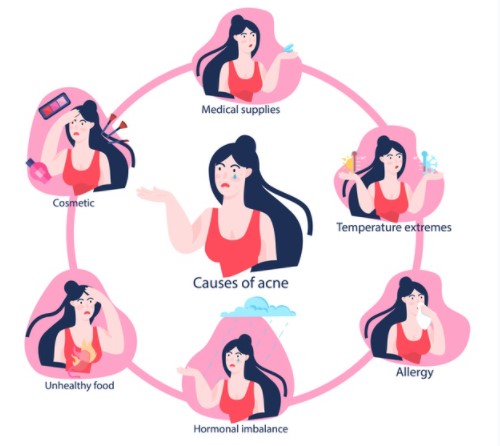
There are so many reasons that trigger acne. Some common factors causing acne includes:
- Stress
- Hormonal Changes
- Lack of Sleep
- Puberty
- Insufficient Water Intake
- Genetics
- Pollution and Harsh Environment
- Inadequate Diet: Consuming more sugar and dairy products
- Humidity and Excess Temperature
- Consumption of alcohol and smoking
- Use of comedogenic products
How to prevent acne?
Zinc Supplement
People with clear skin tend to have higher zinc levels than people with acne.
Zinc is an essential nutrient for the growth of the cell, hormone production, immunity, and metabolism. According to some research, adding Zinc supplements to your diet helps you to deal with acne. Also, besides taking zinc as a supplement you can add zinc oxide to your skincare routine to reduce acne scars.
Consult the doctor before adding a zinc supplement to your routine, as excess intake of zinc may cause adverse effects on your health.
Wash your face twice a day
The most common cause of acne is pollution and the dirt particles in your skin. Long exposure to sun and pollution can harm your skin, so you always need to take care of your skin if you seriously want to get rid of acne.
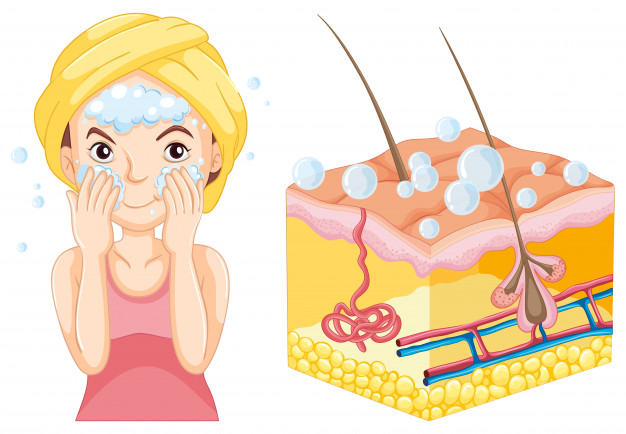
When should you wash your face?
Washing your face more than twice a day can worsen your acne. You need to follow the double cleansing technique before going to bed to remove your makeup and dust particles from your skin. And, you need to wash your face in the morning to remove the excess oil produced by the sebaceous gland. Choose a mild facial cleanser according to your skin type to prevent irritations and breakouts.
Say no to scrubbing!
Never-ever scrub your face when you have active acne. However, you can use chemical exfoliators like AHA/BHA to gently exfoliate your skin to balance your skin texture and color and to remove the dead skin cells that lead to acne.
Water, Water, and Water!
You may be tired of hearing the same thing a million times but drinking sufficient water is the solution to most of your skin problems. Water maintains the hydration level of your skin which ultimately helps to prevent acne.
Maintain Healthy Diet

Believe it or not, but your diet plays an important role in maintaining your skin health. You need to avoid oily and greasy foods, dairy products, and food products with a high glycemic load if you really want to get rid of acne.
Choose your makeup products wisely
Makeup is something that everyone loves but some people may not love the results after they wipe off their makeup. Some cosmetic products may lead to further breakouts and other skin problems. So, while choosing makeup products always choose oil-free and non-comedogenic products- that doesn’t clog pores.
Do not touch or pick your acne
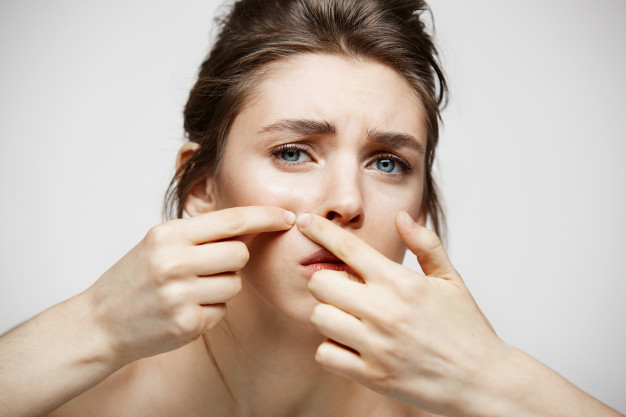
Sometimes popping the pimples may seem the fastest way to get rid of acne, but later it may make things worse for you leading to new acne on your face with the scars. Touching your face repeatedly may get you into serious problems.
Use a clean pillowcase and towel
Wash your pillowcase, towel, and other things that touch your skin every two days, because the bacteria and dirt in these things may lead to more severe acne.
Follow a proper skincare routine
Proper skin care is everything you need! The only way to get rid of acne and other skin problems is to take care of your skin with the right products according to your skin type
Reduce Stress
Even though stress does not directly cause acne, it can definitely worsen your skin conditions. So, you need to live stress-free and always have a beauty sleep to get rid of acne.
Medical Treatments For Acne
If home remedies and skincare don’t work for you(although it does most of the time!) you may need some acne product to treat your acne.
These treatments are medically proven and work really well to get rid of acne
Top ingredients to get rid of acne are:
Benzoyl Peroxide – an ant-microbial ingredient that decreases the number of bacteria that cause acne.
Salicylic Acid– most commonly known as BHA(Beta-Hydroxy Acid) eases inflammation and unclog pores. Also effective in reducing blackheads and whiteheads.
Retinoids– helps to unclog pores and reduce oiliness.
Niacinamide/Nicotinamide-great in minimizing pore’s appearance and treating acne.
Note:
You can find the products with these ingredients easily in stores and you don’t need a prescription to buy these. But if you have a severe acne problem, you need to consult your dermatologist.
How to get rid of acne?
Treating acne with medical consultants would be very expensive sometimes, so here are a few methods for you to get rid of acne with simple skincare and home remedies.
Aloe Vera for acne
Aloe Vera, whose leaves produce a gel is commonly found in everyone’s garden and has hair, skin, and health benefits. Several studies show that aloe vera gel contains salicylic acid and sulfur, which are used extensively used in the treatment of acne.
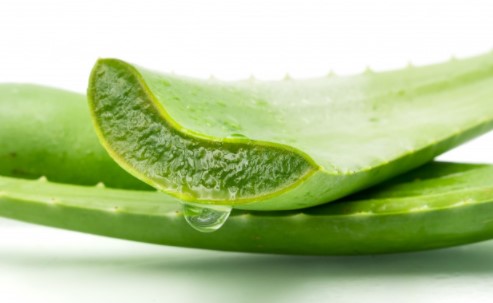
How to use it?
- Take out the gel from aloe vera leaf with a spoon or knife.
- Apply directly to your skin.
- Use this aloe vera gel as a moisturizer every day.
Note: If you don’t have an Aloe Vera plant at home you can buy pure Aloe Vera gel from the stores.
Green Tea
Green Tea has anti-oxidant and anti-inflammatory property which help in the reduction of pimples. Also, epigallocatechin-3-gallate (EGCG) in green tea helps to reduce the secretion of excess oil production in acne-prone skin.
How to use it?
- Put some amount of green tea in boiling water for 5 minutes.
- Let the tea cool and apply the tea on your skin.
- You can also store it on a bottle and spray it on your face.
Consume fish oil supplement
Fish Oil contains Omega-3 fatty acids which help to manage oil production and prevent pimples. Omega-3 Fatty acids also have anti-inflammatory properties, which ultimately reduces the risk of pimples.
If you don’t want to consume fish oil, you can have chia seeds, flax seeds, salmons, and walnuts as an alternative.
Consuming omega 3 fatty acids can help you to take higher amounts of eicosapentaenoic acid (EPA) and docosahexaenoic (DHA) which are responsible for maintaining hydration level and preventing pimples.
Honey and Cinnamon Mask
Honey and Cinnamon contain antibacterial, antioxidant, and anti-inflammatory properties so it may be used to get rid of acne and acne scars.
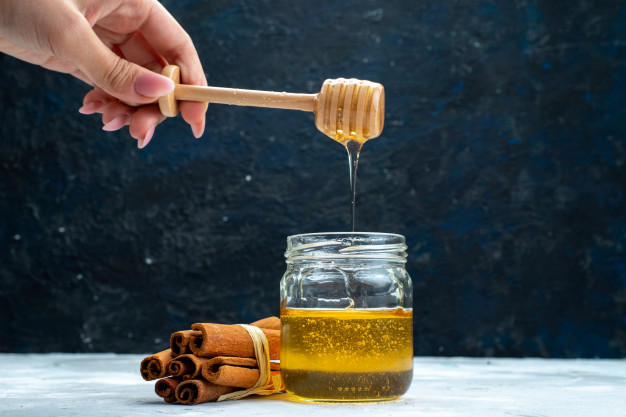
How to apply?
- Add 1 teaspoon of cinnamon with 2 tablespoons of honey to make a fine paste.
- Cleanse your face properly, and apply the mask on your face.
- Rinse the mask completely after 10-15 minutes with normal water.
Apple Cider Vinegar and Honey
Fermented apple cider is commonly used to fight any type of bacteria and viruses and fewer bacteria means less acne!
But apple cider vinegar can cause irritations and burns to your skin if applied directly, so it should always be diluted with water and should be used in small amounts.
How to use it?
- Mix a little amount of apple cider vinegar with water in the ratio 1:3. (Add more water if you have sensitive skin).
- Cleanse your face properly and apply the mixture on your face with the cotton pad.
- Leave it on your face for a maximum of 20 seconds, and wash it off.
Since Apple cider vinegar may show allergic reactions to someone, do a patch test before applying on your skin.
Note:
Since you don’t want to ruin your beautiful skin with some random DIYs that you found on the internet, make sure you do proper research on the ingredients and try those according to your skin type.
More Topics For You
Skincare Routine For Oily Skin
Rosehip Oil: Is it worth the hype?
Korean Skincare Routine: Step-by-Step Guide to Layer Your Products
